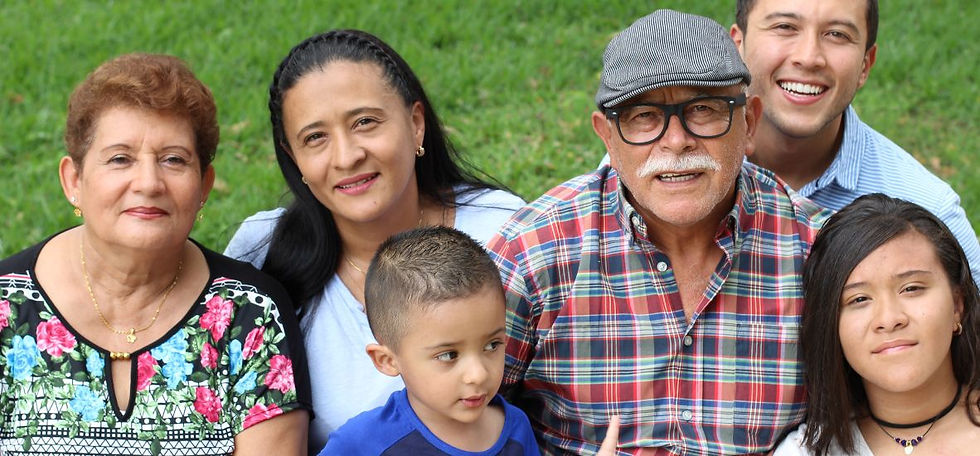What Is USCIS Form I-130: Petition for Alien Relative?
- elizeelaw
- Jan 6
- 4 min read

What is Form I-130?
Every year, many U.S. citizens and lawful permanent residents sponsor green card applications for their close family members who are foreign nationals. The first step in most family-based green card application processes is filing the U.S. Citizenship and Immigration Services (USCIS) Form I-130, officially called the Petition for Alien Relative. It is used by U.S. citizens and lawful permanent residents to start the process of sponsoring a spouse, parent, child, or sibling for a green card. It establishes a legal relationship between the petitioner (a U.S. citizen or green card holder) and the foreign national seeking a green card.
Who should use I-130?
A US citizen or lawful permanent resident may file an I-130 with US Citizenship and Immigration Services (USCIS) to establish the existence of a familial relationship with certain overseas relatives who wish to immigrate to the United States or adjust their status.
US Citizens
If the person filing the I-130 is a US citizen, they may file this petition on behalf of either:
their spouse
their unmarried children under 21 years of age
their unmarried sons or daughters 21 years of age or older
their married sons or daughters of any age
their brothers or sisters (although the sponsor must be 21 years of age or older)
their mother or father (where again the sponsor must be 21 years of age or older).
The US sponsor must file a separate Form I-130 for each eligible relative. However, separate petitions are not required for the spouse or unmarried children under 21 of any beneficiary who qualifies as an unmarried adult child, a married child of any age, or a sibling. They will be considered derivative beneficiaries who should be listed in the same petition and can apply for a green card along with the beneficiary once the petition has been approved.
US Lawful Permanent Residents
If the person filing the I-130 is a lawful permanent resident, they may file on behalf of:
their spouse
their unmarried children under 21 years of age
their unmarried sons or daughters 21 years of age or older.
The US sponsor must again file a separate Form I-130 for each eligible relative. However, separate petitions are not required for the spouse or unmarried children under 21 of any beneficiary who qualifies as an unmarried child either under or over the age of 21 years of age. They will again be considered derivative beneficiaries who should be listed in the same petition and can apply for their green card once the petition has been approved.
Importantly, there is no visa category for married children of lawful permanent residents. This means that if a lawful permanent resident files Form I-130 for their unmarried son or daughter, but the beneficiary marries before immigrating to the USA, or adjusting their status to a lawful permanent resident, USCIS will deny or automatically revoke the petition.
Is Form I-130 the Same as a Green Card?
No. However, Form I-130 is an important step in the process of immigrant visa petitions. Specifically, one would submit an I-130 Form as the first step in helping an eligible family member immigrate to the United States and obtain a green card. After one’s Form I-130 is approved, their family members can submit their immigrant visa petition to USCIS. After approval, USCIS forwards the petition to the National Visa Center for processing.
What are the required documents for an I-130 Petition?
The petitioner will need to submit a number of supporting documents to demonstrate ties to the family member or relative. These documents are required to prove that the family relationship between the petitioner and the beneficiary is genuine. Generally, the required documents include:
Proof of the sponsor’s status as a U.S. citizen or Green Cardholder (birth certificate, permanent resident card, naturalization certificate, etc)
Proof of the legally valid relationship (marriage certificate, birth certificate, etc)
Proof of the nationality of the beneficiary (passport, naturalization certificate,
Proof of any name changes of sponsor or beneficiary
‘Secondary evidence’ documents might be accepted when original documents cannot be located for reasons beyond the petitioner’s/beneficiary’s control.
Contact Elizee Law Firm Today!
Hiring an experienced immigration attorney can make it significantly easier to understand what is expected of you, and how to obtain the required documents. In other words, we are well-equipped with years of experience handling immigration cases. If you are having trouble with one of many commonly encountered immigration matters, we’re here to help. We will assist you as much as possible in collecting and presenting evidence to USCIS to increase your chances of successfully bringing your relatives to the U.S. For more information on how we can assist you, please visit our website at www.elizeelawfirm.com or email us at intro@elizeelawfirm.com.
Patricia Elizee is the managing partner of the Elizee Law Firm, an immigration law firm located at 1110 Brickell Avenue, Suite 315, Miami, Florida 33131. Phone 305-371-8846. The law firm was established in 2012. Ms. Elizee earned her Juris Doctorate at the University of Miami School of Law and her Masters in Law from the University of Washington School of Law.

















Comments